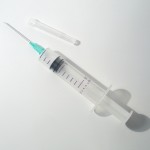
I was concerned when the outbreak of H1N1, or swine flu occurred last April. Like many parents, I worried about my children catching the virus. In April there was no vaccine for H1N1. As I researched it, most experts recommended hand washing was the best way to protect yourself and children from the flu. I also came across statistics that said more people die of the regular flu virus yearly, than what would be expected from the H1N1 virus.
Since it was the end of flu season in April, I decided the chances of us catching it, were pretty slim. Fast forward six months later, and we are at the start of regular flu season, and now there is a vaccine for H1N1. What is a parent to do? Just some of the questions that have crossed my mind are: Do kids really need the regular flu shot, and the H1N1 vaccine too? Would a flu vaccine even help against every strain of the regular flu? Will the H1N1 vaccine cause children to develop swine flu? Will our natural immune systems develop immunity to these viruses without the vaccine?
I have followed a delayed schedule for the childhood vaccinations for both Ryan and Cole. It is my opinion that children are over vaccinated today. I have talked to the children’s doctor extensively about this, and have done my own research on the subject over the years. Often, the long range effects of vaccines are unknown.
It makes me nervous to vaccinate my children with the H1N1 vaccine because it is such a new vaccine. I watched a news story the other night, on a local news station where a doctor said there was nothing to worry about with the H1N1 vaccine, because it wasn’t much different from a regular flu vaccine. He then added that most of the scientists who developed the vaccine tried it out on themselves while developing it. While that is noble, an adults system (I’m assuming the researchers were all adults) is fully developed, while a child’s system is not. What are the long-term effects of this vaccine when given to children? No one can answer this question-yet.
Yesterday Ryan’s school sent home an information sheet on H1N1, and said they would be offering vaccine clinics. It is not mandatory, It said that the students will be vaccinated in one of two ways: “by an intramuscular injection, or in the form a “flumist,” nasal spray.” It depends on what they receive from state and federal authorities. As I read further, it said that children under the age of 10, will need to receive a second dose of the vaccine, a month after the first dose, to “assure full immunity.” I looked this up on the CDC’s website, and it is confirmed by the CDC.
Another issue that the school district raised was the vaccines contain thimerosal. It warned parents that any child who was sensitive to thimerosal, should not receive the vaccine. They described thimerosal as “a substance used as an antiseptic and germ killer. While this is partly true, they failed to mention that thimerosal is a byproduct of mercury. Mercury is a neurotoxin (when it is in the form of methyl mercury). There are no levels of mercury considered “safe” in the human body. Thimerosal is an ethyl mercury, which is chemically different from methyl mercury. However, the CDC says this about thimerosal:
Since 2001, no new vaccine licensed by FDA for use in children has contained thimerosal as a preservative, and all vaccines routinely recommended by CDC for children under six years of age have been thimerosal-free, or contain only trace amounts, except for multi-dose formulations of influenza vaccine. This was done as a precautionary step and not because there was evidence confirming that thimerosal-containing vaccines were causing health problems. The most recent and rigorous scientific research does not support the hypothesis that thimerosal-containing vaccines are harmful.
From my previous research I discovered thimerosal was approved with very little research by the FDA in the 1940’s. In recent years, thousands and thousands of parents have called into question thimerosal’s safety, with some experts and parents pointing to thimerosal laced vaccines as a cause for autism, and vaccine-injuries. While there has not been scientific proof of this yet, the theory will not go away. In March, 2008 I wrote a blog post citing the story government health officials conceded that childhood vaccines caused autism-like symptoms in a Georgia girl, and she should be rewarded from a federal vaccine-injury fund.
This raises the question, does the potential of being harmed by thimerosal outweigh the protection the H1N1 vaccine could provide? The symptoms of H1N1, cited by the CDC are:
The symptoms of 2009 H1N1 flu virus in people include fever, cough, sore throat, runny or stuffy nose, body aches, headache, chills and fatigue. Some people may have vomiting and diarrhea. People may be infected with the flu, including 2009 H1N1 and have respiratory symptoms without a fever. Severe illnesses and deaths have occurred as a result of illness associated with this virus.
Obviously, I take notice of the “severe illness and death” warning. However, the children’s doctor, who has been a doctor for over 25 years, isn’t even offering the H1N1 vaccine, because usally the symptoms are so mild. Looking into the statistics, aaccording to the CDC, between August 30, and October 10, 2009 the death toll from H1N1 in the age group of 0-4 years old was 3%, and in the 5-18 year old group it was 14%. The 50-64 age group had the highest death rate with 32%.
Additionally, the seasonal flu vaccine only protects against one strain of the flu, and there are many strains possible. Having a seasonal flu shot does not guarantee that you will not get the flu. Seasonal flu shots also contain thimerosal.
These statistics and facts bring me to the conclusion, while current research does not show a definite link between thimerisol/mercury vaccines and autism or vaccine injury, the proof that they don’t injure, is not conclusive enough for me. Having reservations anyway about the H1N1 vaccine, and then discovering that my children would need two doses of the thimerosal-containing vaccine, is the nail in the coffin. I think the potential risk of the unknown long-term effects from the H1N1 vaccine and the fact that contains thimerosal, has the potential to do more damage than catching the virus itself.
I also believe the body’s immune system is amazing, if it is given the chance. If it is over-run with many foreign substances, like vaccines, especially with children, how can it operate as it was intended?
There are other alternatives, like following a good hand washing schedule, and a proper diet, that can help build the body’s immunity and ward off illness. Dr. Nicole Sundene, a licensed Naturopathic Physician maintains the blog, Kitchen Table Medicine, which has a very informative article on swine flu, and also what you can do to help prevent it.
Every parent has to make the choice for their family, but not every vaccine that is available is right for every child, or family. I wanted to make an informed knowledge-based choice regarding these vaccines, not one based in fear or on media-hype. I chose to share what I have discovered in hopes it can help other parents who are trying to make the best decision for their families too.
